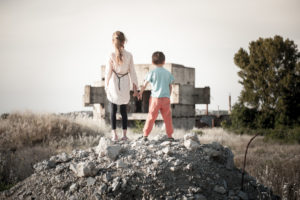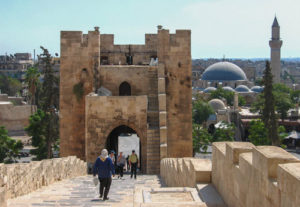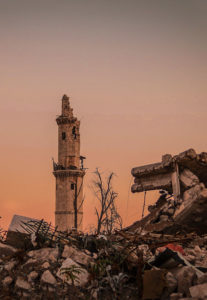In This City is a challenge to journey with us in prayer for 12 key cities in 2019. We ask you to commit to praying for fruit that will ripen and bear the seeds for mature, vibrant and multiplying churches across the Arab world. Find out more in this article from the leader of Pioneers’ Middle East Region.
Introduction
Most of us have become quite familiar with Aleppo over the past eight years. Sadly, it has become infamous for the wrong reasons.
Aleppo’s geographic location has ensured it a place of high prominence through the ages. Its role as a trading centre, midway between the Mediterranean Sea and Mesopotamia, outlived numerous empires. From being an important location on the Silk Road, it has continued to the present day as trading capital of Syria.
When the Suez Canal was established in 1869, however, much trade shifted to the sea, and Aleppo’s commerce declined. But, in fact, dwindling business is thought to have helped preserve the city’s historic landmarks, as it did not have to develop old neighbourhoods to accommodate growing enterprise. In 2006, Aleppo was recognised for its preserved architecture and granted the title, ‘Islamic Capital of Culture’. With a cool semi-arid climate, Aleppo was a pleasant place to live. Before the Syrian Civil War, it was the largest metropolis in the country with an official population of four and a half million (2010). Today, it is home to less than two million people.
 Four years of struggle against the government came to a climax at the end of 2016 when Syrian forces launched a final offensive on Aleppo. Cluster bombs, shells, and chlorine were dropped on neighbourhoods to force the last rebel-held urban centre in Syria to surrender. Over 600 civilians died in those five weeks. The death toll of the entire conflict is thought to have claimed 31,257 Aleppan lives.*
Four years of struggle against the government came to a climax at the end of 2016 when Syrian forces launched a final offensive on Aleppo. Cluster bombs, shells, and chlorine were dropped on neighbourhoods to force the last rebel-held urban centre in Syria to surrender. Over 600 civilians died in those five weeks. The death toll of the entire conflict is thought to have claimed 31,257 Aleppan lives.*
However, after the Syrian Army had retaken control in 2016, over 500,000 refugees and internally displaced persons returned to the city. It is now thought to be the second-largest municipality in Syria. Aleppo, along with Damascus, the capital of Syria, are two of the oldest continually inhabited cities in the world.
*According to the Syrian Martyrs website on 30 April 2016 (last update)
About Aleppo
 Population: 1,850,000 (est)
Population: 1,850,000 (est)
Religions: Sunni Muslims 75%, other Muslim sects (Alawites, Druze, Ismailis) 15-20%, various Christian denominations around 1-2% (down from 10% pre-war)
Ethnic groups: Mainly Arab. There are also a significant number of Kurds (9%).
Geographical size: 190 km² | 118 mi²
Location: Northern Syria
Key historical events: Established around sixth century BC and continually inhabited since. In more recent times the city suffered due to heavy fighting in the civil war, which has reduced the population to a third of the pre-war number. Some have referred to Aleppo as ‘Syria’s Stalingrad’ due to the scale of destruction. Syrian government forces, Hezbollah (Lebanese Shiite militia) and Russian troops fought against the Free Syrian Army and various other rebel groups, as well as against Kurdish squads for four years. In 2016, the rebels lost and the city came under government control, but the war flattened half the town.
Challenges
 People
People
Though they are a resilient people, the war has robbed Aleppans of more than their homes. For many, it cost them family members, friends, and community. Some sustained physical injuries that have permanently altered their lives. Others are only beginning to deal with the psychological trauma they’ve endured. Many Aleppans fled to other parts of Syria and surrounding countries like Turkey and Lebanon, or even further afield. Those who have remained face daily challenges, struggling even to have enough to eat as the economy has been destroyed.
Mental health is still a taboo topic in the Arab world. However, Aleppans are beginning to process their loss by salvaging their heritage. Many are sharing photos and memories of life before the war on Facebook groups in hopes of reconstructing their city, minds, and hearts.
Seekers
The destruction of the civil war has reduced the population of Christians by 90% to only 30,000 people. This makes it even more challenging for seekers to meet other followers of Jesus, or to gain access to Christian resources. However, the actions of ISIS have pushed many Muslims to either turn to agnosticism or to consider following Jesus. Many Muslims, especially Kurds, have started attending the small number of evangelical churches still left.
Team
Currently, there is no team in Aleppo, nor are there any concrete plans to enter the city in the foreseeable future. However, there are opportunities to support church leaders from Aleppo with training.
Prayer points
- Aleppo was home to the largest concentration of Christians in Syria before the war. Even though this population has been decimated, there are still 30,000 left. Pray for both the traditional and contemporary churches. Pray for the Church in Aleppo to experience revival. Pray in particular for training events that are happening over the next few months. These sessions will equip church leaders to serve their people. Pray that as they serve and experience renewal through the Holy Spirit, God would give them compassion to serve the majority population of Muslims, too.
 Before the war, it was challenging to get workers inside Aleppo on a long-term basis. A handful were there for a few years, but sadly, they did not experience much fruit. Pray for God to open doors for workers to enter Aleppo and make disciples.
Before the war, it was challenging to get workers inside Aleppo on a long-term basis. A handful were there for a few years, but sadly, they did not experience much fruit. Pray for God to open doors for workers to enter Aleppo and make disciples.- Kurds are more open to the gospel than any other ethnic Muslim group in Syria. Praise God for this and pray that they would grow in self-control, uprightness, and godliness (Titus 2:12). Many Kurds have found Jesus in Lebanon, where there is more freedom. Pray that they would be called and equipped to return to Aleppo to reach Kurds and Arabs with the gospel.
- Pray for the rebuilding of this broken city. Pray for resources to rebuild factories so that jobs can return and the economy can improve. Pray for homes to be rebuilt. Pray for initiatives to help people cope with the trauma they have experienced. Pray that the church would play a vital role in the restoration and renewal of the city of Aleppo.
One last thing…
A team member informs us that in the city of Kobani (Ayn Al-Arab), part of the governorate of Aleppo, a group of 80 to 100 Kurdish Muslims have publicly become Christians (as reported by Reuters). Let’s rejoice that amid the destruction, God is bringing life.
Through him all things were made; without him nothing was made that has been made. In him was life, and that life was the light of all mankind. The light shines in the darkness, and the darkness has not overcome it.
– John 1:3-5
Thank you for praying with us
Next month, we’ll pray for the city of Ta’iz in Yemen.